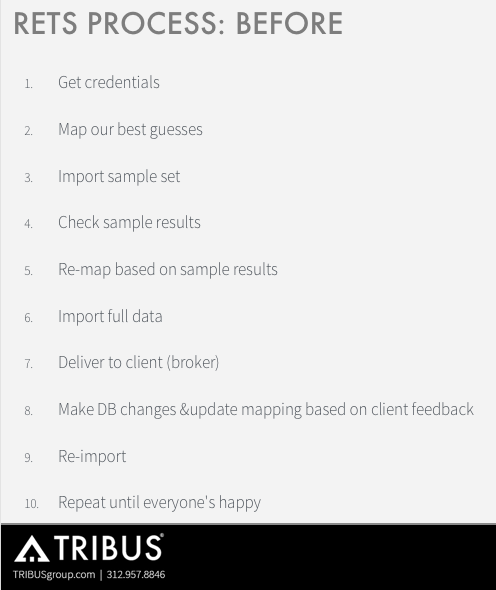Recently, TRIBUS had the honor to share our experience using the Data Dictionary at RESO’s Spring Technology Summit. The theme was “It’s Game On for Data Standards,” and the content did not disappoint. It was refreshing to hear how committed RESO is to consistently improving their Data Dictionary and Web API, and bringing all MLSs on board ASAP. It was also great to get a first look at how some vendors have benefitted from a simplified data management process.
What is a ‘standard’?
Unlike rules, which are often enforced, standards are provided as suggested guidelines. Even though choosing not to follow a standard probably won’t incur a penalty, you’ll likely still notice some negative impacts by trying to make every decision on your own. Increased (and usually wasted) time is often the biggest negative result.
Why establish standards?
We’ve all noticed standards in our everyday life. Whether it’s a widely accepted standard or a more controversial one, I’m sure you’ve been impacted by all of the following.
Learn About Our New Ads and Leads Program - TRIBUS Engage
- Elevators
Even though we’re not directly taught that you should turn to face forward in an elevator, it’s something we all do without even having to think about it. - Time Zones
Prior to the invention of time zones, everyone used the patterns of the sun to determine the approximate time in their location. Problems arose when the railroad was introduced, as it makes catching your train difficult if you don’t know the exact time to board — enter the time zone. - Units of Measurement
Here’s a scenario where two main standards are accepted: the Imperial (A.K.A. the US system) and the Metric. Both are widely accepted (one more than the other), but whichever one gets used is determined by your physical location. Since the adopted standard changes based on the user’s geographic location, and no one can count on just one standard (especially if they travel frequently), many would suggest that one global unit of measurement would be much more ideal. - Keyboards
If you use a computer frequently, you may think that the QWERTY keyboard is the only option. However, there is actually an arguably better alternative out there called the Dvorak Simplified Keyboard. Many typists still select the Dvorak keyboard today because of its improvements in speed; the Dvorak set out to place the most commonly used letters on the home row where they can be accessed with ease. Unfortunately, the Dvorak didn’t become nearly as popular as the QWERTY, so choosing the better alternative in this case could actually cause more frustration, since it’s not as commonplace.

Learn About Our New Ads and Leads Program - TRIBUS Engage
No matter which standard you’re observing or participating in, you’ll notice that each standard excels at establishing order because that’s its main job.
Without this order, everyday life would be much more confusing and chaotic.
Standards are like eating your vegetables — you may not always like them, but they are good for you.
– Katie Ragusa, TRIBUS VP of Product
When to accept standards
We’re not suggesting that every participant agree 100% with every standardized decision. We’re simply suggesting that thinking about our goals as a collective group can benefit each member of our group much more than if each person operated as a unique individual.
As soon as a standard is readily available, well documented and widely accepted;
it’s time to jump on board.
– Eric Stegemann, TRIBUS CEO & Director of Strategy
As the Rails Doctrine states, “You’re not a beautiful and unique snowflake.” And that’s actually very good news.

Learn About Our New Ads and Leads Program - TRIBUS Engage
Benefits of RESO’s standards
TRIBUS obviously approaches Data Standards as a vendor, but the benefits of adoption extend far beyond just real estate technology companies.
For consumers
- Buyers can count on more accurate and complete search results.
- Sellers can rest easy knowing that their listing will appear faster and with more complete info all across the web.
For brokers
- Fewer headaches having to explain unique and/or market-specific fields to vendors.
- Lower likelihood of “innovative” (i.e., ugly) listing descriptions or other data coming into their custom real estate brokerage website (example of what we’re trying to avoid below).
Learn more about broker certification from RESO here.
For vendors
- Quicker data mapping/import process, which leads to expedited launches.
- Simpler to co-mingle data across multiple boards and associations.
- Access to a full, documented list of what data to expect.
Without the guesswork, we eliminate the need for countless hours wasted in meetings where we have to decide how to store odd data, like the Pittsburgh Potty example below.

Learn About Our New Ads and Leads Program - TRIBUS Engage
For MLSs
- Ability to catch errors faster, since many more eyes are on the same standard.
- Lower vendor dependance on RETS team to respond to questions and issues (solved by RESO’s documentation — example here).
Learn more about MLS certification from RESO here.
TRIBUS’ experience with the Data Dictionary
As a company, we’ve known for some time that migrating to the Data Dictionary was the right choice. But the decision of when was unfortunately held up until many MLSs joined the charge.
Since TRIBUS works with real estate brokerage companies who are often in multiple MLSs, we had to either wait until all MLSs in each client market obtained their Data Dictionary certification, or be forced to build many different data importers in order to handle all of the different formats.
RETS versus Web API
Fortunately for TRIBUS (and for our industry as a whole), many MLSs are Data Dictionary certified now — the deadlines have helped boost this effort tremendously. Once we decided to embark on this journey, there was still another big decision to make.
- Web API only?
This was by far our first choice. The standards are the latest and greatest in the industry, and we could display new/updated listing information in near real-time since we can access it via an API call rather than waiting on data to be available for download. However, there’s simply not enough MLSs who are Web API certified at this time for us to go the Web API only route. - Both RETS and Web API?
Since we know Web API is the future standard, we didn’t want to abandon that idea completely; so we considered building both a RETS importer (to use the Data Dictionary) as well as build a system to ingest the Web API. Although this approach would be best for the current certification circumstances, it wouldn’t be best for TRIBUS’ tech team and resources. Unfortunately, this approach would just be much too large for our migration MVP (Minimum Viable Product) approach. - Decision: RETS (Data Dictionary) only.
This decision was a practical one, and the current fact is that we have more clients who we could migrate now if we use the Data Dictionary rather than Web API, and we simply do not have the resources to build both simultaneously. Our decision is to begin with the RETS importer, and soon after additionally implement the Web API.
Project Post Mortem: Before and After
If you’re not a real estate tech vendor who’s had first-hand experience building RETS importers, then we’ll take this opportunity to show you our comparison of before and after we implemented the data dictionary. If you’re an MLS executive, hopefully this allows you to see just how valuable your move to the Data Dictionary standard could positively impact vendors as well as your brokers.
Learn About Our New Ads and Leads Program - TRIBUS Engage


Tips for other vendors
If you’re a vendor in the real estate industry who is looking to build an API/listing importer, or who is considering your own migration to the Data Dictionary, here are our recommendations to you.
- Stay up to date on which MLSs are certified.
Within the ‘certified’ group, there are a few additional checkpoints – Data Dictionary (i.e. RETS) versus Web API certification (an MLS could be both simultaneously), as well as a multitude of certification levels within the Data Dictionary group (Silver, Gold, Platinum).
You can find an updated list of MLSs 24/7 on RESO’s website. - Read the documentation!
Unlike some technical specifications, RESO’s documentation is well-written and extremely thorough. During our entire implementation, we probably only had to submit two questions, since everything else was covered. - If you’re using RETS, the offset isn’t 0.
This tip is specific to vendors who go with the Data Dictionary approach. Even though this is documented in RESO’s spec, we thought it was worth mentioning here since it may be something you’d otherwise miss.
TRIBUS’ standards wish list
Since we’ve covered so much about current standards and implementation of those standards, we also want to take this opportunity to highlight a few areas for continued improvement. Here’s a few ideas that would benefit the team at TRIBUS most right now.
Learn About Our New Ads and Leads Program - TRIBUS Engage
- Standardized IDX Approval Paperwork
If you’ve been through the IDX approval process with more than one MLS, you know it can be a nightmare. It’s not that any one set of paperwork is flawed — the issue is that almost every MLS creates their own unique documents. These documents can be tough to locate online, difficult to follow and almost always get rejected once due to some data being missed.
Huge props to MLS Grid’s efforts, as we hear that this is something they’re working on already! - Standardized Display Guidelines
Vendors and MLSs will all recognize the line, “The listing broker must be displayed in a prominent location.” We have no issue giving credit to the listing broker, but who defines what’s acceptable as “prominent”? Unfortunately, this “standard” is much too subjective and can change based on who’s conducting the site review, leading to unnecessary rejections for the real estate broker’s website.
Again, we’d like to give credit to MLS Grid for taking on this standardization effort as well. - All MLS-Hosted Images On SSL
This is undoubtedly the simplest standard to implement, and it comes with so many benefits! For MLSs who require that they be the listing image host, please get on board with today’s security practices and implement SSL. This can allow the images to load faster, and will prevent mixed content warnings when your listing images appear on real estate broker’s website.
Event photos courtesy of Bill Lublin and Krishna Malyala



